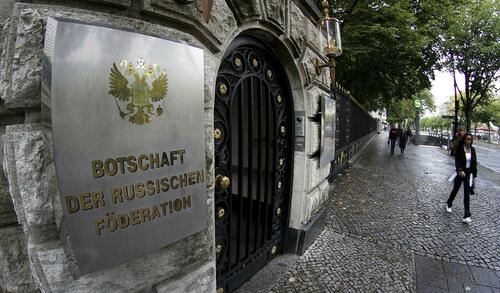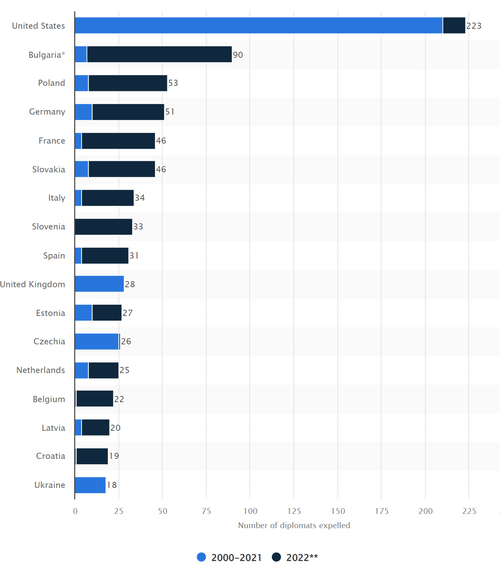
Russia's diplomatic links to Europe continue to collapse at a moment nuclear rhetoric is increasing and growing more dangerous. Simple communication among governments also continues to grow worse, making conflict de-escalation among major powers all the more difficult.
Germany announced Saturday that it is planning to expel more than 30 Russian diplomats from Berlin. German Federal Minister for Foreign Affairs Annalena Baerbock indicated to local media plans for the new wave of expulsions Saturday.

A German media source cited officials as saying "More decisive action must be taken against Moscow's spies."
Allegations of spying have driven large-scale expulsions at various times over the past two years, put have picked up in frequency and scale particularly after the Feb.24, 2022 Russian invasion of Ukraine.
Germany has claimed that the presence of Russian intelligence agents and officials in Berlin has greatly increased of late, with German officials asserting the embassy is now staffed even better than during the Cold War.
Other countries which are backers of Ukraine have also continued to take punitive measures against Russian diplomats.
Number of Russian diplomats expelled worldwide from 2000 to 2022, by country":

You will find more infographics at Statista
"Last month, Estonia expelled 21 Russian embassy staffers, saying it would host only eight diplomatic officials on its territory — matching the size of Tallinn’s team in Moscow," Politico reports over the weekend. "The Kremlin responded by kicking Estonian Ambassador Margus Laidre out of Russia — the first ambassadorial expulsion from the country in the year since Russia launched its full-scale invasion of Ukraine," the publication added. "Tallinn then ended Russian Ambassador Vladimir Lipayev’s tenure on Pikk Street."
This and other Russian embassies and consulates in Europe have faced accusations of acting as 'spy hubs' - far beyond what's considered the 'normal' presence of intel agents and officials.
Russia’s diplomatic links to Europe continue to collapse at a moment nuclear rhetoric is increasing and growing more dangerous. Simple communication among governments also continues to grow worse, making conflict de-escalation among major powers all the more difficult.
Germany announced Saturday that it is planning to expel more than 30 Russian diplomats from Berlin. German Federal Minister for Foreign Affairs Annalena Baerbock indicated to local media plans for the new wave of expulsions Saturday.

A German media source cited officials as saying “More decisive action must be taken against Moscow’s spies.”
Allegations of spying have driven large-scale expulsions at various times over the past two years, put have picked up in frequency and scale particularly after the Feb.24, 2022 Russian invasion of Ukraine.
Germany has claimed that the presence of Russian intelligence agents and officials in Berlin has greatly increased of late, with German officials asserting the embassy is now staffed even better than during the Cold War.
Other countries which are backers of Ukraine have also continued to take punitive measures against Russian diplomats.
Number of Russian diplomats expelled worldwide from 2000 to 2022, by country”:

You will find more infographics at Statista
“Last month, Estonia expelled 21 Russian embassy staffers, saying it would host only eight diplomatic officials on its territory — matching the size of Tallinn’s team in Moscow,” Politico reports over the weekend. “The Kremlin responded by kicking Estonian Ambassador Margus Laidre out of Russia — the first ambassadorial expulsion from the country in the year since Russia launched its full-scale invasion of Ukraine,” the publication added. “Tallinn then ended Russian Ambassador Vladimir Lipayev’s tenure on Pikk Street.”
This and other Russian embassies and consulates in Europe have faced accusations of acting as ‘spy hubs’ – far beyond what’s considered the ‘normal’ presence of intel agents and officials.
Loading…





